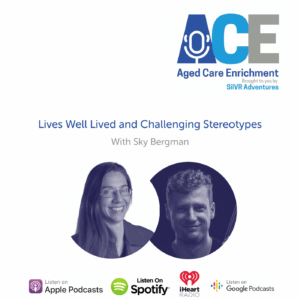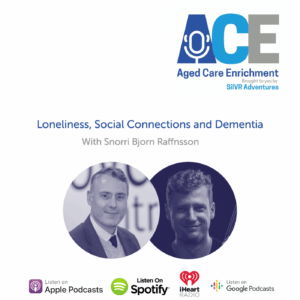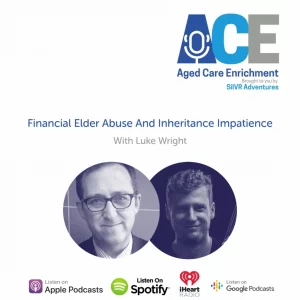Transcript
Ash de Neef: Well, Sandra, thank you so much for joining us today on the program.
Sandra Hills: Great to be here, Ash.
Ash de Neef: Now, can we start with a bit of your background and the work that you’re doing currently?
Sandra Hills: Okay. So I’ve been around for a long time and I have only ever worked in the health and human services area. And I’ve worked for governments. So I’ve worked for local government and state government, never for federal government. And I’ve worked in third sector or the values driven sector or whatever you want to call it. That’s the only area I’ve worked in.
So I’ve worked in health. I spent a lot of time in the disability sector. I’ve managed just about every human services program known to mankind, including children’s services. But actually I’ve always found my calling more in the disability health and aged care area.
So that’s where I’ve used my space. And I worked my way up going from being a nurse right through to you know, management job as in management very early. I’ve been a CEO for a number of times I had my first CEO gig was when I was 25, which is pretty young. Managing a disability agency.
But I’ve done project work, so I’ve been quite. You know, I’ve actually looked at broadening my skills more rather than just going up the greasy pole and getting there by 35 and going, “what am I going to do with myself?” So I’ve done a lot of project work and some research work.
So I started out as a nurse but I worked really quickly as a community nurse. I didn’t really like the traditional hospital structure. But I’ve also got a psychology qualification and a research qual and some management quals, including an MBI. So I’m quite broad in my background, which I think is a good thing.
So that’s me, and I’ve spent a lot of time in this scene in volunteering my time with a number of, I mean, I’m someone who believes that you have to contribute to the industry that you’re in. And you should do that to the best of your ability where you, when you’ve got the time. So I have always put my hand up and really been involved in lots of things.
So, at the moment I’m a director of the aged care industry workforce council. I’ve just finished a stint as a director on community chef board, which was which was a fantastic opportunity.
I’m on the national aged care Alliance I’m also on the, on the board of Anglicare Australia. And had various roles with Lizer over the years as well.
So yeah, I do lots of other things outside of work. And in Oh, when was it 2017? I was awarded and OAM for my work for older Australians, but also for advancing the role of women in the workplace. So then Benetas have done a lot of work in that area.
Ash de Neef: Fantastic. That’s really comprehensive. Thank you. Can we double down here? The aged care industry workforce council – What are the aims of the council?
Sandra Hills: I just want to say, first of all, that it really the first leadership of its kind in Australia. People would know that they would have heard of the rapport, A Matter of Care that was commissioned by the government and John Pollaers led that piece of work. And basically the council is responsible for implementing the 14 strategic actions in that report.
But not all of those actions, they can do themselves because they have to actually work with industry, government, employees, consumers, and the unions. And what we’re really looking at is making sure that we have the suitably skilled staff so that older people can feel safe and confident when they use either residential services or community based services.
So that’s really what they’re focusing on. But they’re also focusing on providing a more sustainable aged care system as well with a much higher focus on the consumer. Which is really entrenched in the report A Matter of Care.
And the vision of the rapport and also, hence the workforce council is to develop a world-class workforce that can provide quality and skilled aged care services, which met the needs of older Australians now and into the future. We’re really focused on the future.
It’s industry led which is unusual so there are more industry people providers on the council council of nine. But then there is also a union representative and a consumer representative as well.
So we basically have taken those 14 strategic outcomes in the report, and there’s a lot of detail around what we’re hoping to achieve or what needs to be achieved in those 14 outcomes. And we have actually turned them into prioritisation action plans and pieces of work.
And each director has got one or two leads on all of those areas, as well as, they might be on a working group, that they’re not leading, but they’re looking at one area.
So we have been chosen or have been asked to join based on our contribution and our leadership and the work we’ve done in our own organisations. So there isn’t anyone on there who hasn’t shown innovation, initiative, that workforce is something that that’s really key to them.
And of course, If we don’t address the workforce issue, it doesn’t matter what the Royal commission tells us we should do. We’re not going to do it. Cause we’re not going to have the right, the right staff with the right skills. We’ve got to get more people in the industry with passion and with the right skills and they have to be paid properly.
Ash de Neef: Great. So when you mentioned the, there’s a couple of different streams that each board member will take, or each director, sorry. You’re heading up the leadership program stream, right? Which is facilitating closer collaborations with policymakers, which is something you’re probably in a great position to do with experience in government and on the other side.
So what does that work look like?
Sandra Hills: So I’ll try and keep this simple because there’s lots of different things involved. So I’ve been involved in a couple of things.
So the Strategic Action#2 , which is what’s called the voluntary industry code of practice. This is really important. This actually is one of the most important pieces of work in the Strategic Actions and in the John Pollaers report.
Because basically what it’s saying is that a lot of industries have these voluntary industry codes of practice, but aged care doesn’t.
So it’s actually asking. Saying to the providers, “you are going to sign up. You are going to sign up to this in a voluntary capacity”. And say that “you are going to pledge your organization and your staff and your governance, your board, that you were going to perform in these areas.”
And the areas, there’s seven principles. And they’re principles that actually consistently flow throughout the four strategic actions. So we’re talking about things like governance, quality of staff, training, participation and involvement of consumers in decision-making, co-design, quality of care, all those sorts of things.
There’s nothing there that you go, “Ooh, we can’t do that.” Commitment to continuous, best practice and those sorts of things.
And so LASA did some of the, Leading Age Services Australia as a peak body, did a lot of the work in this area to start with. And then now we’ve picked it up.
If you go on the aged care industry workforce council’s website. You’ll see that they’re asking people to pledge. So they’re asking providers to pledge and also individuals, individual staff to actually pledge their commitment.
And then what happens is that on your own website, so on the Benetas website within 12 months, we have to develop up an action plan as to how we’re going to.
So we take the seven principles, we list what they are, and we say how we think we’re performing in that area, where the gaps are and what we’re going to do. And then we make that public, once we’ve completed that.
So, this is one of the areas we need to do quite a bit of work on. I know that one of the things that John Pollaers found when he started his research to write his report was that people in the community were quite shocked that we didn’t have a code of practice. They thought that, that we would and we, and we don’t.
So that’s one thing that we’re, that we’re looking at.
Ash de Neef: Fantastic. And, and speaking quite broadly, a lot of those strategic actions are requiring aged care providers and, and industry actors to take on voluntary change. Is it something that the industry is willing and excited to do? For example, with the voluntary code of conduct,
Sandra Hills: I think the industry is tired. Ash, they’re tired. They’ve just been through a, well particularly those in Victoria um, the C19 issue -we had our own challenges.
I think it’s been well recognized that the industry is significantly underfunded. We’ve got the Royal commission. We’ve got a little bit of a snapshot about what that might mean in terms of what the changes might be. But you know, you will have groups of people which includes Benetas who are not superheroes. But can say that things have to change and want to participate and shape them and want to be thought leaders in that area. And that’s my job to try and make sure that we do the business as usual, but I don’t overburden people. We prioritize what we do.
But I also make sure I choose the right people who are excited by that. And not people who just come to work to come to work. So we want engaged people. But there are some companies that are hanging around to see what they might get financially. There will be some changes in terms of closure, closes of services, sales of services.
There will also be those that’ll just put their head in the sand and say, “this is too hard and it’s, it’s not my job. Government should be doing this. I’m not doing this. What’s wrong with the system now?” There’s a whole range of people on the spectrum. I think though, having been around the industry for a while, there has been a few people move on.
There are some people who are just tired and over it. And I saw this as a chance for them to move on. But I think most people are really waiting for the outcome of the Royal Commission with quite a lot of excitement, but government will probably take some time as they should to respond thoughtfully to how we go about this.
Ash de Neef: That’s a great segue to the Royal Commission. You mentioned that that phrase, which is kind of heard a lot, that this is government’s responsibility or this idea that it’s not the industry, it’s the government. Where do you think the balance lies there and taking responsibility for the change in culture within the industry?
Sandra Hills: Well, they say that a fish rots from the head and who’s the head in this instance? That saying normally refers to a board. So it would be my board. But it’s not just that it’s the government.
I think that what I haven’t heard is a vision from the federal government, we haven’t heard a vision from the Prime Minister about aged care.
It’s more about, “well, let’s just listen to what people want, and then we’ll, we’ll do what the community want.” The big question is though, the industry needs transformational change, not just a few cosmetic changes. And that’s the big difference.
So we have one commissioner at the moment who seems to be…they could have changed their mind. I don’t know. Big transformational change, which will take time. Change to the aged care act and a whole lot of other things and a lot of money. Versus maybe just change that’s more incremental.
So that’s a big difference. And I don’t think this current government, in my opinion, I haven’t seen any big transformational change happen, when I think about some of the other changes that have happened years ago.
So I think that’s what we’re looking at.
But the industry needs to be ready. And I don’t think any government will move unless you know, getting aged care or older people, as the priority is really important. So there’s a lot happening behind the scenes to try and get the community involved in understanding what some of the issues are.
Because if people don’t rise up and raise it as an issue with their local pollies, et cetera, it won’t be an issue. Now already we’ve heard the prime minister talk at his press club address.
He did talk about aged care. Aged care has gone up a number of times from different ministers, and the prime minister. So it’s looking positive, but the industry is not leaving anything to chance.
You would probably be aware that there is a big campaign of seven peaks [peak bodies] including the church sectors.
So Anglicare Australia is one of them as is LASA too. And they’ve hired a very repeatable campaign company to run a national campaign in the lead up to the budget. And also if there’s an election this year. To try and get people to understand in the community that things need to change and what they need to do and try and focus on aging as an issue for the community, not just for people who work in aged care.
Ash de Neef: Yeah, that’s quite a pragmatic response. I wouldn’t say it’s cynical, but you’re understanding the reality that the government is reluctant to make widespread change. Do you think this will be a big election issue coming up in a future election?
Sandra Hills: So far it’s been mentioned a couple of times, normally aged care would never be mentioned. When there was a by-election quite a few months ago in New South Wales, no mention of aged care. And you know, COVID hasn’t helped.
And now we’ve got issues around unemployment and issues around job seeker payments, and housing, we always are competing. So I’m always positive. But the providers and others are not just sitting back going well, “let’s just, you know”…We’ve actually changed our tack in terms of what we used to do.
But the providers have got to do what they have to do to Ash. I mean, they can’t sit around and complain. And it’s not just about more money because the culture – you asked about the culture. So the culture is also from the organisation. And we’ve got to set that, and that leads from the top.
So that’s about my board myself and at Benetas we’re absolutely ready for it. Which is why I’ve committed myself when the Matter of Care was developed and released.
I said to myself, “okay, I can do lots of things with my time, but actually I’m going to spend time. I’m going to commit myself to this work and my team as well.” And they’re all really keen and they’re all involved on different working groups in contributing.
They love it because it’s part of their personal development to say, “we actually participated on that national group and we can see where our input is.”
Ash de Neef: It’s interesting that you’ve brought up the method for influencing government there is to inspire the community, to ask for change as opposed to a direct method. And I know when you were working in local government and state government, you’ve probably seen both sides of this as well with lobby groups and peak bodies working directly with the government.
Do you feel like this goes beyond the ability of lobby groups at the moment?
Sandra Hills: I think the problem is that people will still lobby. And of course there are some who are concerned that say a collection of larger providers who work in the private sector who have a great portion of the beds will be lobbying government separately and that we’ll do a special deal.
And then you’ve got the, obviously you’ve got the provider peaks and you’ve also got the consumer peaks and the unions. So it’s difficult. But you can’t stop people lobbying, but I do think speaking as one voice – the divide and conquer, it makes it much easy for government not to do what they need to do if there’s lots of people they need to talk to, and that’s what we have to stop.
That’s why the G7 is really important. That’s why, I would support one body as a peak body, as a provider peak, not two like there are at the moment.
Ash de Neef: Well moving on now, you said in an interview with weekly source that you think in a couple of years, there’ll be a lack of residential services in Australia due to issues with investment in COVID. How does this affect the decisions that Benetas is making at the moment?
Sandra Hills: I still stand by that. What we are doing is we are actually moving slower with our residential care new builds. Where we’ve made commitments, we’re continuing with those, but we’re looking at those, obviously making sure that there’s a need. And we’re looking at how we build those.
But we’d probably be looking more to upgrade existing facilities – we’ve just made an acquisition, which will come across in April from another, with another ongoing facility.
Building a Greenfield site, it’s far more expensive, but we will be accelerating our development in retirement living or senior’s housing options. Looking at continuing care communities where we can. So we’ve got retirement living residential services as well.
And then offering home care and allied health which we do as well. We will be also accelerating our work in community care, community health and care. Particularly in the private area – so fee for service in the home care area, nursing and also allied health.
So they’re probably some of the areas that we – we’ve reviewed our strategic plans so we’re differently making some changes.
Technology features heavily. Technology, and also the work that we’re drawing on our customer experience and staff experience and engagement are really important. So we’ve got our work cut out for us, but Residential services is here to stay. It’s just not – our map is quite different now. It’s slower and we’re focusing on other areas.
Ash de Neef: Obviously there’ll be, they’ll still be older people who’ll need a higher level of care that only a residential service can provide. Do you think that for example, for retirement village or other communities, they will be able to fill the hole there or will there be a shortage?
Sandra Hills: So there’s lots of really good things in the 124 recommendations that the council assisting made to the commissioners last October. But there’s lots of good news for retirement village people in terms of, people move in when they’re much more able and they can age in place, but you need to provide these sorts of services and you need to build the facilities in a certain way.
Absolutely. I mean, we know people don’t want to go into residential care. There’ll always be a need for residential care. People come on in older and frailer and they’re not staying as long. We know that, but we need to turn our attention to retirement living, which is what obviously we are and others are doing.
And also is looking at specialisation of the residential service that you provide. So whether or not you look at dementia specific we’re currently looking at the possibility of focusing on a palliative care only service. So I think the services will be more specialised, but they certainly aren’t going anywhere because some people just can’t…
Even if the recommendation from the commission actually support the payment of someone from much higher level home care package. It’s never going to, I don’t think it’s going to be enough. Because don’t forget home care, you can be living by yourself.
In residential services, it’s actually other staff around you. So it’s that synergy of numbers that you’ve got. Even if you’ve got eight people in an apartment, you can have one staff member.
If you’re by yourself, your money doesn’t go as far. So I think unless you’ve got someone assisting you, it’s a partnership with informal care, family, friends, et cetera. So I think that’s always going to be a challenge.
Ash de Neef: And do you think that smaller aged care providers are positioned well to adapt to these changes? Or do you think that’s going to be a challenge for the smaller ones?
Sandra Hills: Some of them will because they smart. They’re smart operators and they’ve already started to move. They know their market, they know what they want, all that sort of stuff. They’ve already started to move. And they are specializing in a particular market.
I think that if you’re just providing the same as everybody else, and you’re in an area where there’s a lot of competition. I think, and depending on how large you are – I mean, we’ve got the efficiency of scale. And I think being diverse is really important. We provide all services, everything, including veterans affairs, everything respite.
I think diversity is a good thing in this environment. I think that with the changes in care packages, with the funding of care packages starting from February. I think there’ll be more people getting out of care packages because they won’t have the cash flow. So I would never say that small services are dead in the water because some large services are terribly inefficient.
Large services can also create inefficiencies. But I do think that given that…I don’t know the stats a hundred percent, but I think that there’s something like, 50% of providers of the 3,300 providers in Australia of residential care only have one facility. That’s is not sustainable.
Now many of them are in rural areas and we all know that different politicians have been successful in supporting people. But some of those services are not sustainable. So they need to be looked at whether or not they, they are provided as part of the local health service, for example, which some of them are.
Ash de Neef: Yeah, you raise a good point, which I wanted to touch on there that this specialisation may not be possible in more remote or rural areas. How do you think care will change out there?
Sandra Hills: Oh, gosh, one of the things I say to people when they want to go to rural areas, I just say, “well have a look. If that’s important to you, as you age, you need to see what services are there.” I think rural areas for quite some time have been looking at the hub and spoke method, where they have outreach services. And they’ve been quite – I mean, I can talk about Victoria – but quite successful in bringing, say cancer services, oncology services to large regional hospitals.
It’s more about those that are in more rural, more remote areas. And I think that more outreach services and community health is the way to go. But, that’s where you’ve got telehealth, tele medicine, some of those things that started to be developed a lot more during lockdown. But then you’ve got the issues of the that are receiving the services, having the right health literacy.
And sometimes they don’t. So they don’t know what they’re looking for and the doctor can’t help them if…they don’t have that basic health skills.
So I think that’s always going to be a challenge I really do. And then of course, they’ve got to get the doctors out. Attract people out to those areas anyhow. That’s a real challenge, attracting doctors out to those remote areas.
Ash de Neef: Sandra, what do you see as the biggest opportunities for growth throughout aged care in this coming year?
Sandra Hills: Certainly home care and allied health. Definitely. We know that, your listeners would have been, would be well aware of the ongoing issues with the number of people on waiting lists.
So I think certainly those areas. Looking at fee for service, looking at allied health – they’re probably the areas that I would be focusing on. Looking at whether or not there’s anything that your state government is doing, that you might want to focus on. Like social housing for older people in Victoria, there’s some opportunities there.
How would you link that up with yours? I mean, those people are eligible for all the home care services. And then I think there are still a whole lot of areas around focusing on early intervention, maintaining health and wellbeing. So we do some work in that area or like a frailty screening tool and those sorts of things.
But any businesses that hasn’t started out looking at it’s staff. And how it’s going to attract its workforce plan, its leadership plan and its customer experience plan. And mapping the journey and having customer principles, we have done a lot of work in that area, but we’ve got a lot more to do.
I think they’re the foundational skills and the technology. The business intelligence, what we do with data, how we use it. They’re the sort of foundations of a good company going forward. People should have already started looking at those areas.
Ash de Neef: What do you think about staff turnovers within aged care? And you’re probably in a good position as CEO of Benetas to have an overview of this.
Sandra Hills: We have pretty low turnover. We know that the last stats I saw, which were a couple of years old, the turnover was like 25% – ours is only about 12. That’s really high, but we’ve got a program of trying to move to only permanent part time.
And if we use casual they’re part of a casual pool. And of course with C19 trying to make sure that people only stay at the one facility. But it is really difficult because most of the staff are part time and some people want casual work. They’re happy to work at a couple of spots.
And that’s the same with community care. So I know some providers have much higher turnover.
Also quality. I mean, we actually are getting far better at letting people go in their orientation time. We just don’t think they’re going to make the grade. We’ve given them all this orientation and induction – they’re not the right people.
Putting more time at the front end, so you don’t hire them in the first place. Make sure you attract the right people, but it gets back to me attracting the right people. Not attracting enough people. some providers just appoint people anyhow. We have a mandatory you must have a cert three in individual support before you employed.
Apart from a program we have where we actually bring people in and train them up and that’s been piloted at the moment. And I think government will probably move to that at some stage.
But we don’t have a huge, it’s not like advertising to work in a really sexy industry. That’s also a strategic action, number one.
And that is, you know, the image of the industry is not good. So if it’s not good, how do you attract people to work in it?
Ash de Neef: Yeah, what sort of things do you think would attract younger people who are just entering the workforce to come into aged care?
Sandra Hills: Well, the campaign that’s going to be rolled out which I can’t talk too much about, but it actually goes to the heart – to the emotions of people and people’s values. So they’re going to really focus on a values driven choice as to why you would come. Because you’re not coming into the industry for the money, unless you’re in a management role.
But it is about, you make a difference. You know, we have a campaign, we’re rolling out at the moment. It’s about making a difference. You Make a Difference Campaign. What you do matters. And we’re showcasing all people that cross our services in a whole range of areas.
So I think it is about that. You want to make a difference? These people really need you.
It’s a really different campaign than what the Australian Defense Forces might use for example. I really hope it’s successful because I think it’s a really good campaign, but we’ll wait and see.
Ash de Neef: Absolutely. Thank you so much for your time, Sandra.
Sandra Hills: Thanks Ash.






